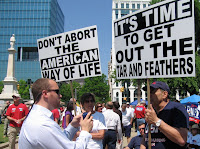A new poll suggests many tea partiers -- the ones polled in Washington, at least -- are actually more prejudiced than we thought. Three quarters of the Tea Party supporters interviewed said the government shouldn't guarantee equal opportunity for African-Americans. Nearly 90% of tea partiers agreed with Arizona's controversial, borderline racist immigration law, and 63% supported racial profiling of Muslims in airports. Over half think gays and lesbians "have too much political power ... compared to the size of their group."
"The data tells us this opposition and frustration with government is going hand in hand with a frustration and opposition to racial and ethnic minorities and gays and lesbians," said Matt Barreto, a political science professor and director of UW's Washington Poll.
 I've only been to one Tea Party rally, but the demographics of that gathering suggests tea partying isn't exactly a multicultural affair. Seriously, finding a black person in that photo of the Columbia rally with the Confederate flag flying high above the crowd (you can click to a larger version) is like playing Where's Waldo -- there's literally only one.* Add that to the poll's finding that 54% of tea partiers think "immigration is changing the culture in the U.S. for the worse," and the evidence of bigotry among Tea Party ranks gets even stronger.
I've only been to one Tea Party rally, but the demographics of that gathering suggests tea partying isn't exactly a multicultural affair. Seriously, finding a black person in that photo of the Columbia rally with the Confederate flag flying high above the crowd (you can click to a larger version) is like playing Where's Waldo -- there's literally only one.* Add that to the poll's finding that 54% of tea partiers think "immigration is changing the culture in the U.S. for the worse," and the evidence of bigotry among Tea Party ranks gets even stronger.Barreto, citing a recent New York Times poll that found most tea party supporters approved of government spending for Social Security and Medicare, and research by fellow UW professor Christopher Parker, concludes "The tea party movement is not just about small government or frustration. It's (also) about a very specific frustration with government resources being used on minorities and gays and lesbians and people who are more diverse."However, it's simply irresponsible to say every tea partier's only grudge against the federal government is the African-Americanness of its chief executive or his tolerance of alternative lifestyles. The Tea Party has some valid points about government spending and power, and they simply dilute and cheapen their message by not eschewing the hate speech that tends to germinate at their rallies. Still, it's pretty damning when a study finds Tea Party support and conservatism in general are valid statistical predictors of racism.
As the figure shows, even as we account for conservatism and partisanship, support for the Tea Party remains a valid predictor of racial resentment. We're not saying that ideology isn't important, because it is: as people become more conservative, it increases by 23 percent the chance that they're racially resentful. Also, Democrats are 15 percent less likely than Republicans to be racially resentful. Even so, support for the Tea Party makes one 25 percent more likely to be racially resentful than those who don't support the Tea Party.Some commentators call the Tea Party's supposed increase in influence "the rise of the new right," but Political Carnival accurately points out that it's simply the same old right with a new name. This country has seen right- and left-wing fringe groups since before it was even a country; these extremists are simply a little better organized. Tea Partiers risk alienating themselves even further and marginalizing their causes -- even the legitimate ones -- if they continue to condone and fuel such intolerant behavior and beliefs.
*If you actually looked, there's a black person standing under the red-and-white umbrella on the left side of the photo. I wasn't kidding when I said it was like finding Waldo.


No comments:
Post a Comment